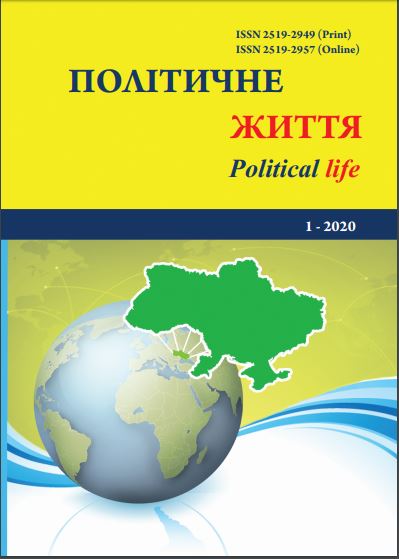Institutional and psychological determinants of the virtual mass formation in the post-truth age.
DOI:
https://doi.org/10.31558/2519-2949.2020.1.10Keywords:
virtual mass, mass political behaviour, post-truth, political institutions, institutional and psychological determinants, value systemAbstract
Peculiarities of institutional and psychological determinants of virtual mass formation in the post-truth era are investigated. It is determined that the main institutional determinants that form the virtual mass are the peculiarities of the social order, state institutions, the peculiarities of the cultural environment, etc., while the psychological determines the motivational system, the individual-psychological characteristics of the individual, which is included in the structure of mass and peculiarities of mass consciousness. Information means and virtual communication today begin to act as instruments of manifestation of the civic and political position of the individual, its virtualization, anonymity and often lead to the simulation, acceptance of the individual's social roles. It is revealed that the globalization of the network has a close relationship with the political processes taking place in modern society. It is indicated that the excessive glut of information, the emergence of egalitarian values that arose from the postmodern belief that universal truths do not exist, that « truth » depends on the cultural context, led to the emergence in the 21st century of a new post-truth era. Particular attention is paid to the latest manipulative technologies of the post-truth era, which underwent mass in the 21st century, through the implementation of Internet narratives into the virtual behavior of the ordinary individual, and from there – the real society. It has been determined that modern society, apart from individualism, is characterized by the loss of control over most socio-political processes, with a sharp increase in risks, which results in complete chaos in the formation of stable institutions to ensure the normalization of political processes and the formation of political behavior in real life.References
Бауман З. Индивидуализированное общество / пер. с англ. под ред. В. Л. Иноземцева. – М.: Логос, 2005. – 390 с.
Бодріяр Ж. Симулякри і симуляція / Жан Боріяр; пер. з фр. В. Ховхун. – К. : Вид-во Соломії Павличко «Основи», 2004. – 230 с.
Бодріяр Ж. Фатальні стратегії / Жан Боріяр; пер. з фр. Л. Кононовича. – Л.: Кальварія, 2010. – 192 с.
Вілбер К. Трамп і епоха постправди [Текст] / Кен Вілбер; пер. з англ. М. Климчука. – Л.: Видавництво Terra Incognita, 2019. – 136 c.
Гупта Діпак К. Тероризм та політичне насильство. Київ: Основи. 2010. 397 с.
Кастельс М. Інтернет-ґалактика. Міркування щодо Інтернету, бізнесу і суспільства / Пер. з англ. –
К.: Ваклер, 2007 – 304 с.
Липовецки Ж. Эра пустоты. Эссе о современном индивидуализме Москва, 2001. 332 с.
Норт Д. Насильство та суспільні порядки. Київ: Наш формат. 2017. 352 с.
Ортега и Гассет Х. Восстание масс URL: http://lib.ru/FILOSOF/ORTEGA/ortega15.txt_with-big-pictures.html (дата доступу 25.01.2020 р.)
Свідерська О. І. Співвідношення психологічних та інституційних детермінант масової політичної поведінки в транзитних суспільствах: дисертація кандидата політичних наук: 23.00.01 / Свідерська О. І. – Львів, 2018. – 222 с.
Темелкуран Е. Як втратити країну. Сім років від демократії до диктатури / Едже Темелкуран ; пер. з англ. І. Возняка. – Х. : Віват, 2019 – 240 с.
Тоффлер Э. Третья волна Москва: ООО «Фирма «Издательство ACT», 1999. URL: http://royallib.ru/book/toffler_elvin/tretya_volna.html (дата доступу 25.01.2020 р.).
Уебстер Ф, Теории информационного общества / Френк Уебстер; пер. с англ. М. В. Арапова,
Н. В. Малыхиной; под. Ред. Е. Л. Вартановой. – М. – Аспект Пресс, 2004. – 400с.
Хейлз К. Н. Як ми стали постлюдством: Віртуальні тіла в кібернетиці, літературі та інформатиці. –
-ге вид., виправ. / Пер. з англ. – К.: Ніка-центр, 2013. – 426 с.

